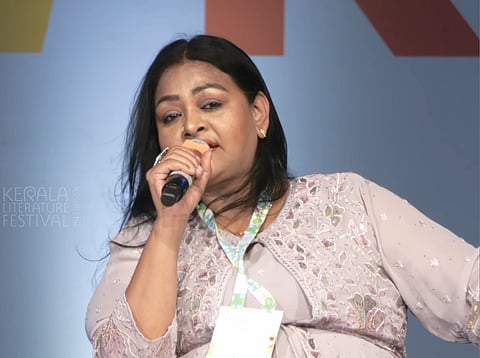

“A woman standing outside the box of morality” — that’s how Malayalam screenwriter Deedi Damodaran described yesteryear actor Shakeela, arguably a superstar, who reigned the cinema halls of south India with her stints in erotic films in the early 2000s. Speaking at a session titled ‘The Myth of Morality’ at the seventh edition of the Kerala Literature Festival (KLF) in Kozhikode, Shakeela, who is still active in Tamil film circles and the miniscreen, said she simply did not know the meaning of morality.
She also recalled how Malayalam cinema once made a brand out of her, and how the same industry is now scared to cast her. “Now they say that if they cast me, the film will be perceived in a different way,” she told moderator Deedi on Friday, January 12.
Shakeela began the session by recalling a distressing experience she had a few months ago in Kozhikode, when the authorities of the HiLITE Mall in Kozhikode denied permission to conduct a trailer launch event for a film by director Omar Lulu at the mall, allegedly after they came to know about Shakeela’s participation. “I was told not to attend the event, and they claimed it was because of potential overcrowding. But I believe in god. Now who can stop me [from attending an event in the same Kozhikode]?” she asked, thanking the hundreds who had gathered to attend her session at KLF.
Back in the day though, Shakeela had the agency to dictate her own terms for her films, which is a rarity in the male-dominated film industry, Deedi pointed out. To this, the actor said, “In my films, I am the hero, the heroine, and also the story. If I raise a demand before doing the film, they have to get it done. Otherwise I won’t give my dates. I know that’s not something that happens with many women actors. Many of them get such low remuneration that they are ashamed to admit it in the open.”
Recalling her stint in one of her most celebrated films, Kinnarathumbikal (2000), Shakeela said her remuneration for five days at the time was Rs 20,000. But the film became a huge hit, she said. “Kaathara came after that. I shot that film for 10 days, and per day, I got Rs 10,000. Ahead of my next film Thankathoni, I told them that the food here was not working for me, so I am going to Chennai for three days and then return. But they asked me not to leave before completing the shoot. So I told them I would stay back if they gave me Rs 1 lakh, and they said okay. They gave me the money immediately, and on the fourth day, they even booked flight tickets for me. Then they gave me another Rs 2 lakh. Apparently they had assumed that I was asking for Rs 1 lakh per day. So I got Rs 3 lakh for three days. This was the first time I was even seeing such an amount of money,” she recalled, adding that from then on, she started to take Rs 3-4 lakh per call sheet. “I often had two call sheets per day, and suddenly I knew how it felt to be rich.”
But that didn’t mean she was not exploited anymore, at least financially, she said. “There were instances where I go for the shoot of a film, and they would make me shoot scenes for another film without letting me know. Because of my language barrier, I often had no clue what was happening. Eventually, I started telling them that I will not shoot in Kerala anymore, because here they would be calling all of the shots. I decided that I will only shoot in Chennai from now on,” Shakeela said. Some 65-70 bank cheques these filmmakers gave her bounced, she added, after which she refused to take cheques.
Shakeela was also one of the very few actors to act out an orgasm in Malayalam cinema, Deedi pointed out. Shakeela said, “While acting, I often take inspiration from other actors. If I had to cry, I would cry like Manorama ji. If I am doing funny roles, I would think of Urvashi chechi. But [orgasms], I have not seen anywhere. So with my experience, I had to show a fake orgasm. That is called acting, and that’s what made me Shakeela.” She also pointed at the phenomenon of orgasm gap, wondering how many married women can say that they have actually had an orgasm. “Many women don’t even know what an orgasm is. You should not be shy about it,” she said.
The actor also acknowledged that exploitation of all kinds are prevalent in cinema, even if she personally had not faced many of them. But when asked about the need for instituting an Internal Committee (IC) to prevent them, Shakeela claimed that while an IC is a good idea in itself, it is not practical in the film industry. “Do you think if somebody goes and files a complaint to the IC, they will continue to get work? No,” she said. The actor went on to controversially question the #MeToo movement, asking why women had to degrade themselves and tell the public that someone harassed them when nothing would eventually come out of it. “But shouldn’t the offender be punished?” Deedi asked, to which Shakeela questioned how many rape accused persons have been punished. She also alleged that the punishment for rape was not severe enough in India, and that complaining about rape was therefore pointless.